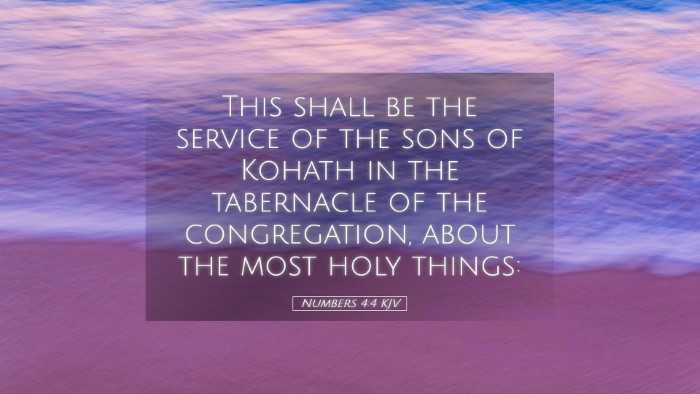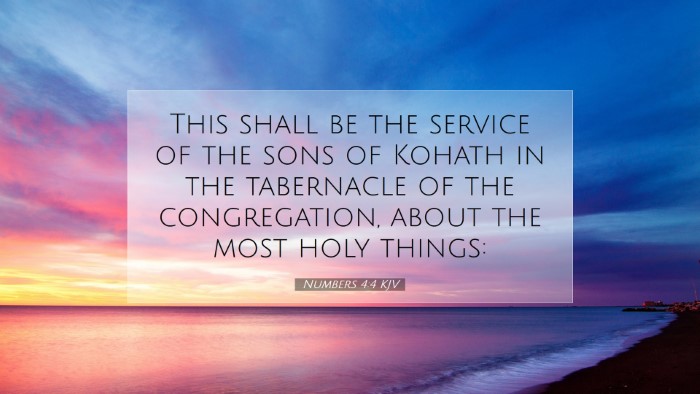Commentary on Numbers 4:4
Numbers 4:4 states:
"This shall be the service of the sons of Kohath in the tabernacle of the congregation, about the most holy things."
Contextual Background
The Book of Numbers serves as a historical account of the Israelites during their journey through the wilderness. It provides insights into the organization and responsibilities of various tribes, particularly concerning the Tabernacle, the dwelling place of God's presence among His people.
The Role of the Kohathites
In this verse, we encounter a specific group within the Levitical tribe: the Kohathites. Their duty centered around the most sacred items within the Tabernacle.
Insights from Matthew Henry
Matthew Henry highlights that the children of Kohath were entrusted with significant responsibilities:
- Servants of the Sanctuary: They served in close proximity to the most holy elements, thereby underscoring the holiness associated with their tasks.
- Glimpse of God's Holiness: The Kohathites encapsulated the idea that to serve God effectively, one must understand the gravity of holiness.
- Importance of Order: Their organization speaks volumes about God's desire for order in worship and service.
Perspective from Albert Barnes
Albert Barnes provides a thorough examination of the significance of the service of the Kohathites:
- Most Holy Things: He elaborates that the items they cared for included the Ark of the Covenant, the altar of incense, and other essential instruments of worship, signifying deep spiritual truths and responsibilities.
- Divine Protection: Barnes remarks on the protective measures ordained by God to ensure that only specified individuals were permitted to handle these sacred objects, reflecting God's serious nature regarding holiness.
- Symbol of Spiritual Life: This is illustrative of how, in the New Testament, believers are also called to care for the 'most holy' aspects of one's own spiritual life.
Adam Clarke's Commentary
Adam Clarke provides further nuanced understanding of the Kohathites' role:
- The Weight of Service: He notes that the Kohathites had heavier responsibilities as they transported the most sacred items, indicating that true service to God often comes with weighty duties.
- Reflection on Leadership: Clarke suggests that the leadership roles within the church can draw from this model, where certain responsibilities are more revered, demanding a higher level of accountability.
- Spiritual Readiness: Clarke emphasizes that their commitment required careful preparation and a mindset of readiness, which is essential for anyone serving in spiritual capacities today.
Theological Implications
As we reflect on Numbers 4:4, various theological implications emerge:
- Holiness of God: The idea that God is holy and requires holiness from those who serve Him remains a critical theme throughout Scripture.
- Divine Order in Worship: The structured approach to worship and service is a recurring biblical principle, showing that God values organization in His church.
- Call to Personal Responsibility: Just as the Kohathites were entrusted with holy tasks, so too are believers called to steward their own responsibilities with diligence and reverence.
Practical Applications for Today’s Church
For pastors, students, and scholars, there are practical applications derived from the reflections on Numbers 4:4:
- Understanding Roles: Recognizing the importance of each member's role in the church as being integral to the body of Christ.
- Emphasis on Holiness: Encouraging a culture of reverence and respect for God’s presence among the congregation.
- Preparation for Service: The necessity of preparing spiritually, just as the Kohathites were to be prepared to handle sacred items, highlights the discipline required in ministry.
- Teaching about Divine Responsibility: Pastors can use this scripture to teach congregants about their personal relationships with God and the corresponding responsibilities that such a relationship entails.
Conclusion
In conclusion, Numbers 4:4 provides a rich landscape for theological reflection and practical application. The service of the Kohathites remains a vital reminder of the seriousness with which God regards the care of holy things, as well as the responsibility placed on His people to serve Him with dedication and reverence. By embracing these lessons, modern-day believers can grow closer to understanding what it means to be stewards of God's presence and His holiness.


